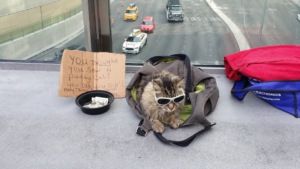News
News in Digest: Hands out, but don’t beg
This article is more than 8 years old.
The socially-vulnerable can apply for 50,000 kroner, but they better not ask any passers-by

Look at what the cat dragged in. Try calling that begging (photo: Pixabay)
Two pieces of news in the last month have clearly demonstrated that while Denmark likes to look after its vulnerable, it is less keen on the vulnerable looking after themselves.
Just weeks after an initiative was announced that will grant socially-vulnerable people access to life-changing purchases, Rigspolitiet and the City Police confirmed that the number of people charged with begging has never been higher.
Making a difference
Under the terms of a four-year project proposed by Torsten Gejl, the Alternativet spokesperson for social issues, socially-vulnerable people will be able to apply for up to 50,000 kroner from a 10 million fund.
Once they have chosen a lifestyle choice to improve their quality of life – for example, it could be dental work or IT-related – the client will sit down together with a social worker and prepare a budget for how the money will be spent. Applications can begin on July 1.
Taking back control
“Instead of one-size-fits-all solutions, we take as our starting point the needs of the individual – be they drug addict, abuser or mentally-ill – and make the person in question an expert on their own life,” explained Gejl to Metroxpress.
Rådet for Socialt Udsatte secretariat head Ole Kjærgaard is excited to see what happens.
“It is a really exciting initiative,” he said. “It might give some people the power to take control of their own lives in ways that nobody else has imagined up to now.”
More begging charges
According to figures from Rigspolitiet, the state police, a total of 76 people were charged with street begging last year – considerably higher than the nine charged in 2013.
It is particularly in Copenhagen that numbers have risen, which Kjeld Farcinsen, a section head at City Police, told DR was the result of “efforts starting in 2014 when the City Police decided to launch a targeted effort against the growing number of street beggars”.
In 2014, 19 people were charged, but the number then rose to 35 in 2015, which Farcinsen attributes to people first being warned in the form of a ban from the area for five years, and then being charged on their second offence.
More public reports
The police also revealed that the number of street beggars being reported to the police has jumped in recent years.
“Since the press has placed more focus on the problems, people have become more aware of what is illegal, so more people are reporting the issue to us which we then respond to,” said Farcinsen.










































